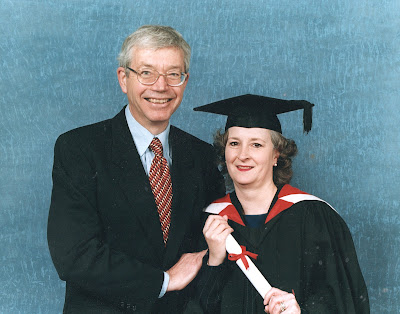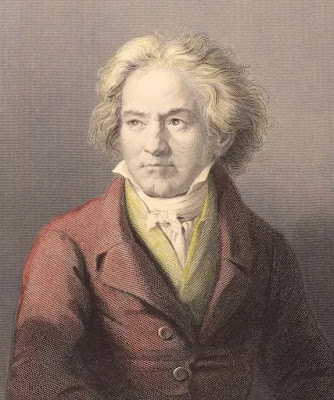An intriguing title for a blogpost - or perhaps a turn off. Who has the time to read the English bard these days? Why focus on a medieval Italian poet? Why prioritize Beethoven when there are so many other composers of music? Why single out Rembrandt when other artists abound? Nevertheless, this blogpost focus will give me an opportunity to explore some threads that my recent reading has highlighted. I would like to try to unravel them. And you may find the outcomes interesting.
 |
| Professor John Took |
Let me start by referencing a book that I finished reading a week or so ago. It became clear to me almost at once that this volume was one of the most difficult-to-read volumes I had ever encountered. I could only manage twenty minutes at a time. But I persevered because I sensed that the author was communicating ideas that were profoundly important. The book is published by Bloomsbury at £20 and is called 'Why Dante Matters - An Intelligent Person's Guide' (2020). The author is John Took. Googling the title will show that I am not alone in finding the work heavy-going; indeed, there is little
evidence that those who commented on the book got much from their encounter with the volume.So why did I bother? In summary, it was because I have a deep respect for scholarship. Professor Took knows what he is talking about. I wish that he had found and developed a style of writing our common language in a style that prized not only coherence but also cogency in the form of shorter sentences. When I touch the keyboard as a writer I want to create meaning in a way that the reader will find easy to digest and leave him or her exclaiming 'That was a worthwhile read'. But John Took delights in composing elaborate sentences to achieve his aim of telling his audiences that Dante is a medieval poet of genius whose works speak to us in profoundly important ways still.
 |
| Published in 2020 |
I feel a little ashamed that I have reached the age of 74 and not yet read Dante. The Divine Comedy is now on my bookshelf, although I think I should wait until a translation approved by Professor Took - by Robin Kirkpatrick (2006/2012) - arrives from my eBay seller. I noticed that Took did not choose to recommend the World Classics translation that I had purchased before reaching the end of his so-difficult-to read book where he makes his recommendations for further reading.
It is not just John Took's compelling case that has swayed me towards understanding why Dante matters. I read from the words on the inside of the front cover that T.S. Eliot, whose reputation as one of the finest poets of the last century is secure, believed that 'Dante Alighieri divides the world with Shakespeare, there being no third'. As I indicated in the previous paragraph, I am a sucker for scholarship.
 |
| T.S. Eliot (1888-1965) |
 |
| William Shakespeare (1564-1616) |
With the passage of time and a tad of insight, I now more fully appreciate the hard work and scholarship that underpinned the achievement of my late first wife and Oxford contemporary, Glynis Donovan, in securing gradings of Alpha Beta for both the exam papers on her Special Subject: Dante. Most of her ten other exam papers received similar grades. Glynis gained a very good First Class honours degree and was working on a dissertation under the supervision of Balliol's Maurice Keen, exploring the work of John of Legnano, a 14th century Italian jurist, at the time of her tragic death in 1974.
 |
| Glynis Donovan with her husband, Rob, at the Sheldonian Modern History degree ceremony in Oxford, 1970 |
My taking up of Dante now is shaped by both Professor Took's advocacy and the part the poet played in Glynis's academic life. We live better when we value the achievements of others, not least those who are and have been close to us. My wife, Louise Donovan, and I were married in 1976. Her excellent and thought-provoking dissertation: A Psychoanalytic Critique of Eccentricity (1998), awarded in part-fulfilment for the degree of Master of Arts in Psychoanalytic Studies at the University of Essex, sits next to me on my study shelves.
 |
| Louise Donovan with her husband, Rob, at the M.A. in Psychoanalytic Studies degree ceremony in the University of Essex, 1999 |
Back to Professor Took. Here he is in the Preface to 'Why Dante Matters', explaining his aims in writing what he calls 'this fresh meditation on Dante':
'I hope ... to confirm how it is that, over and beyond his status as a cultural asset and indeed as a cultural icon, he still matters to us. The undertaking, I know, is problematic, not least in that like all the great representatives of our tradition - be it Shakespeare in the sphere of letters, Rembrandt in the sphere of portraiture or Beethoven in the the sphere of music - Dante matters in as many different ways as those entering into his presence. What follows, then, ... is simply my own sense of how it is that ... he enters still into communion with all those busy at the point of ultimate concern, of what in truth it means to be under way on the plane of properly human being.'
Wow! - Took is setting up Dante as a guide to understanding how to value the meaning of life. Nothing less.
The writings of Dante take the reader beyond 'the particularity of ... his [Dante's] own ... uniquely precious presence in the [medieval] world' and '... reaches out to all those likewise anxious in respect of the innermost meaning of it all, of what actually matters about their being there as creatures of ultimate accountability.' (p.200)
 |
| Ludwig van Beethoven (1770-1827) |
 |
| Rembrandt (1606-1669) - self-portrait, aged 63 |
Let me explore some of the assumptions that underpin these thoughts of Took and ask myself how far I share such views.
- Do I share the belief that there is such a thing as 'our tradition'? I would say 'Yes - but there are dangers in adopting too exclusive and imperial a stance'. As our world perspective becomes more global, we need to identify and associate ourselves with traditions other than the one we may call our own, the tradition soaked in European renaissance and enlightenment thought and peppered with north American influences over the last two centuries.
- Do I associate myself with what others may call the 'high culture' beloved by Professor Took. I do. I want to learn from the creative output of great men who have communicated, through their words or music or brushes, ineffable glimpses into what we as a species can feel and grasp about our human identity. There is much else to learn from other human sources too - those who are female; who come from other cultures and other faiths; who have no faith; and so on. But we need to make the time to still learn from what may loosely be called 'the classics'.
- Do I believe in our 'ultimate accountability'? I do. Not in the sense that perhaps Professor Took does. I don't have much sense of God as an authority before whom we will be judged at the end of our lives. But I do very much believe we all have a personal responsibility within our society to strive for a better world and refine ourselves as best we can so we develop as much understanding and empathy as possible.
- Having retired from University College London a couple of years ago, I now study in splendid isolation in my room, alone with Dante Alighieri.
- As far as Dante is concerned, I've always made a point, and still do, of emphasising that I am speaking from his point of view, leaving it to the students to make what they will of it all. Preach at them, and they will turn off. Point up, however, the existential significance of the text - its status as an account of the agony and ecstasy of human beings under the conditions of time and space - and they will be all ears.
- My experience as a teacher is that, if you address issues of importance in the areas both of self-interpretation and of world-interpretation, and take care to define and to develop them just above the level of the student's familiarity and capability, then they will rise to the occasion.
- Dante's Commedia is an existential analysis of astonishing power and precision. ... As Paul Tillich puts it - and he for one understood exactly what is going on in Dante - the Commedia constitutes the 'greatest poetic expression of the existentialist point of view in the Middle Ages'. A Dasein analytic we might, with Heidegger, say avant la lettre.
- This [a secure and happy childhood and then a loving relationship with my wife] has confirmed me over the years in a sense of the immanence of the divine in human affairs, of the incarnational intensity of the Christian message.
- Beethoven gives me most pleasure. His power to quicken the pulse ... was most certainly there in the moment of creation. Somewhat like Aligheri himself: a prior, perpetual, and providential presence among us.
 |
| Robin Kirkpatrick's translation has the approval of John Took |

No comments:
Post a Comment